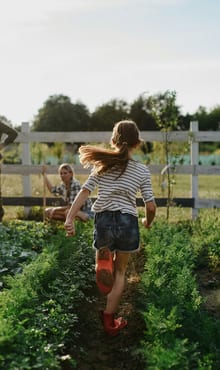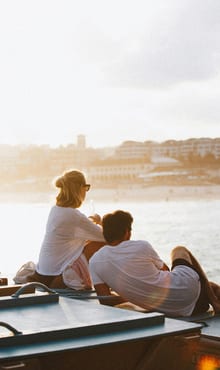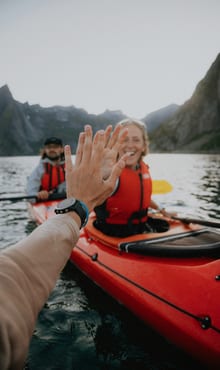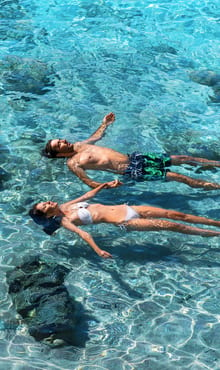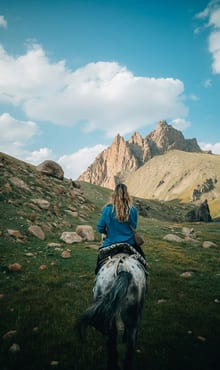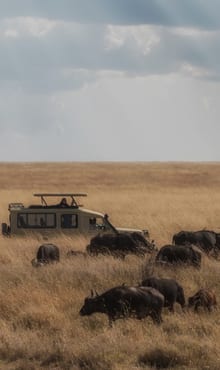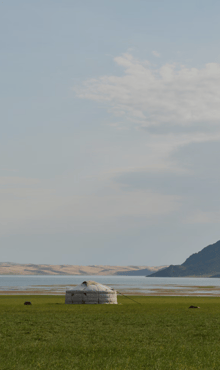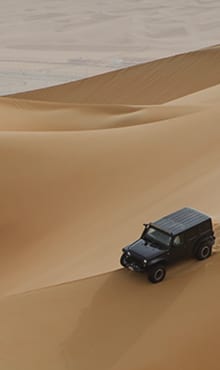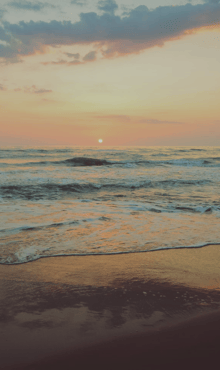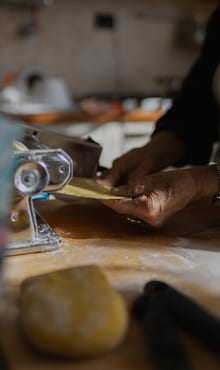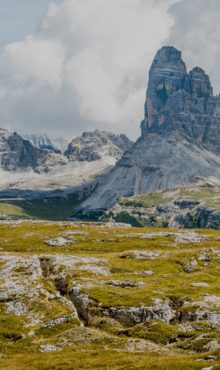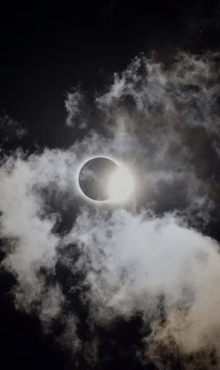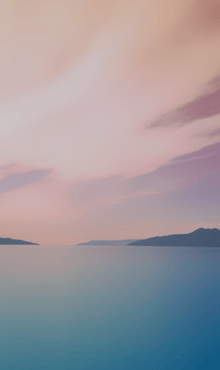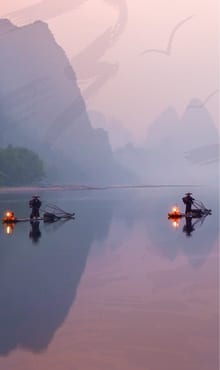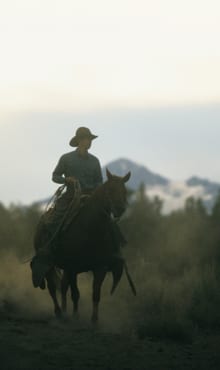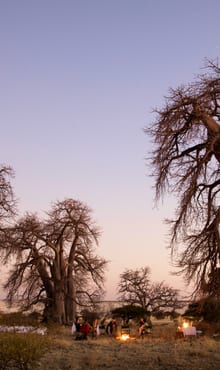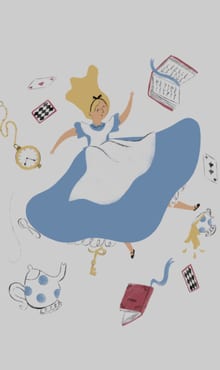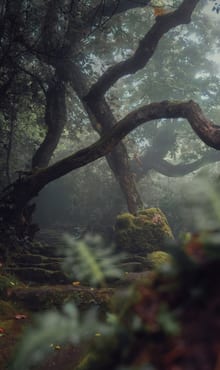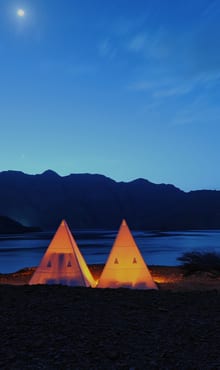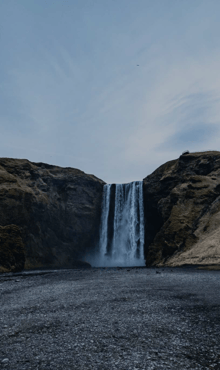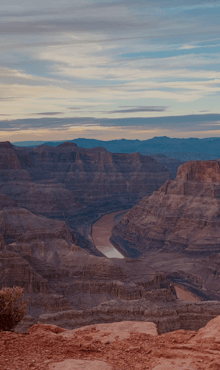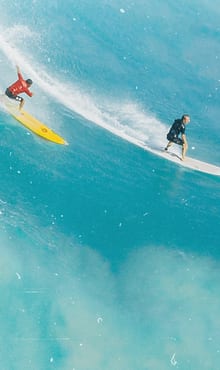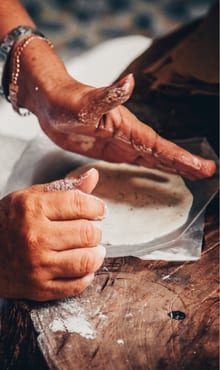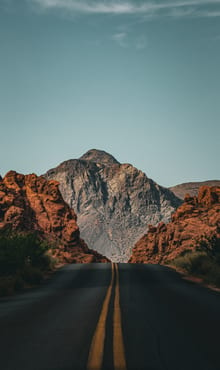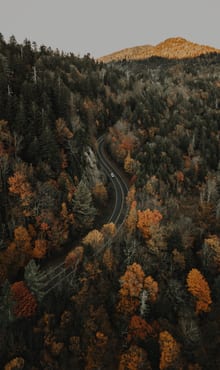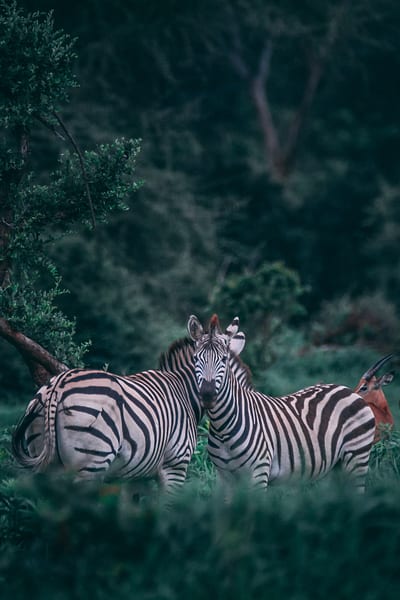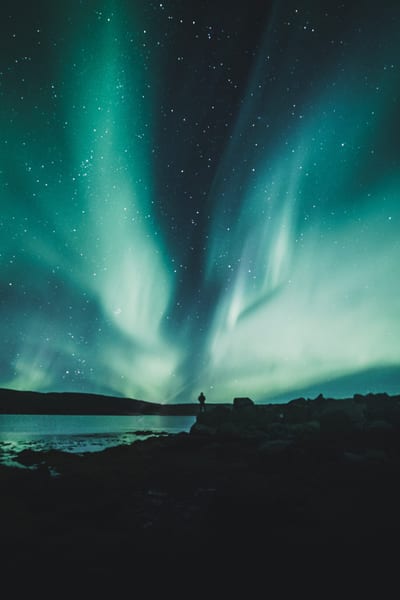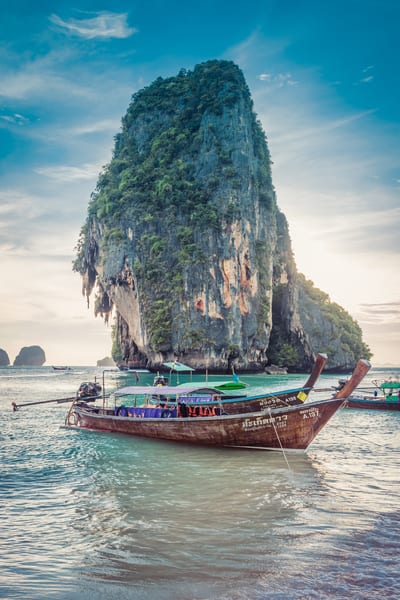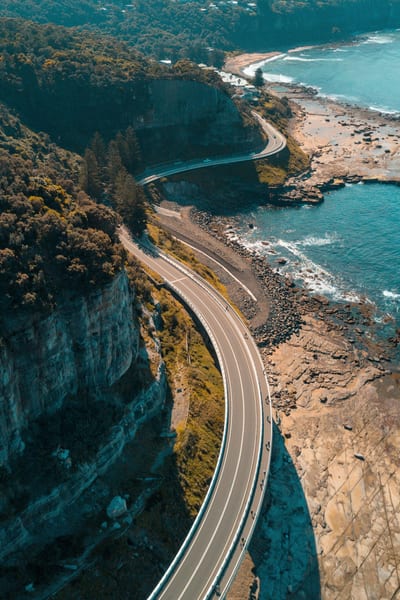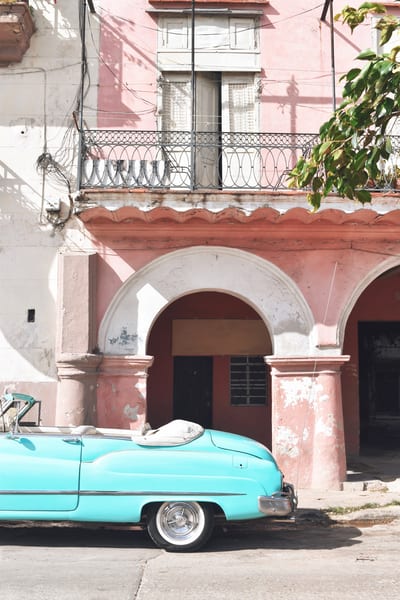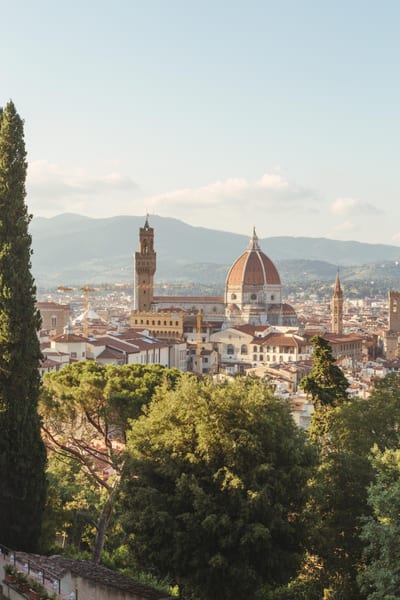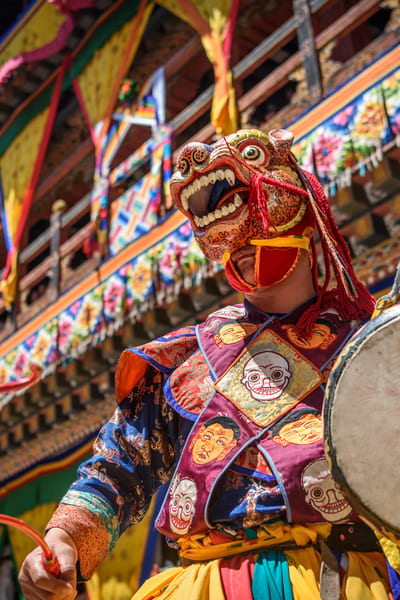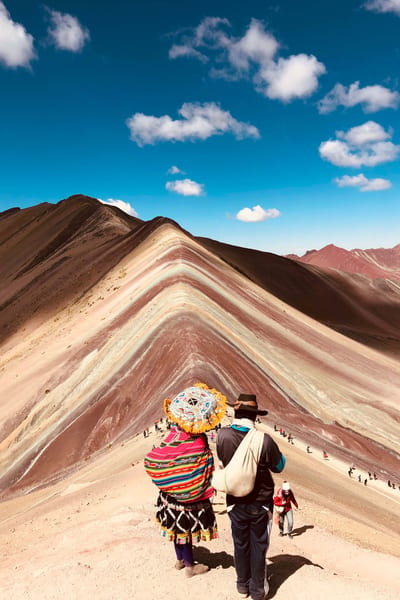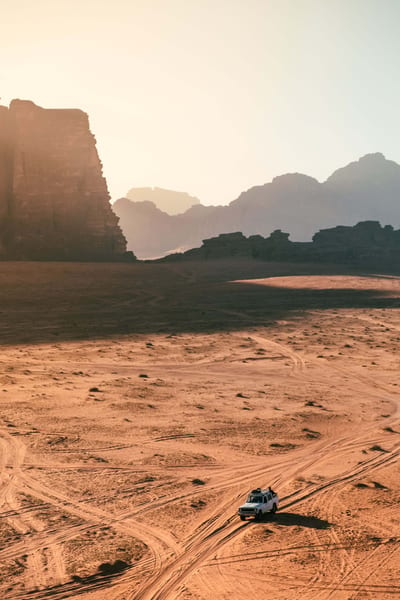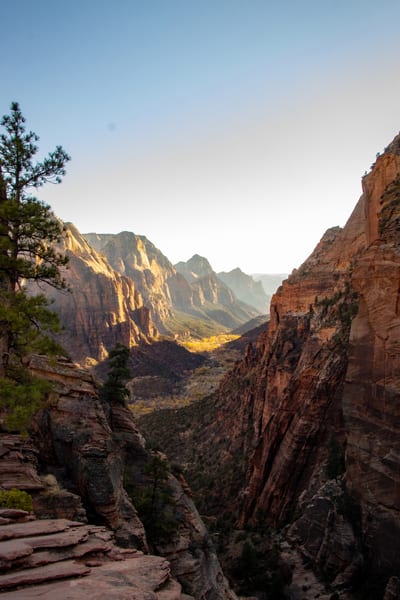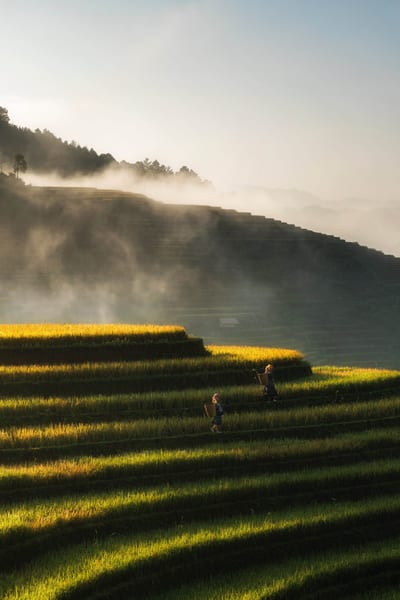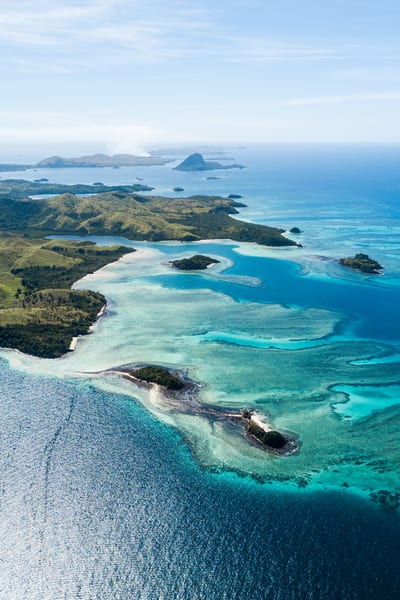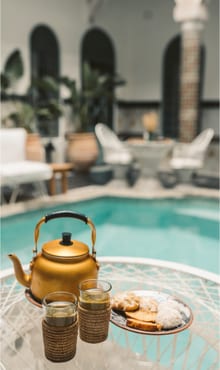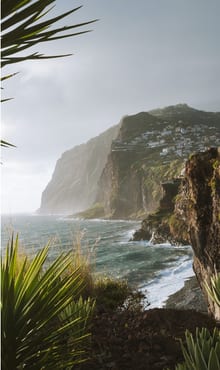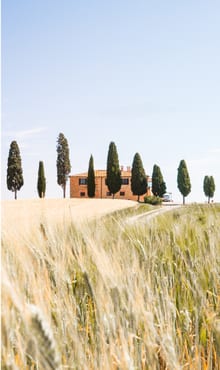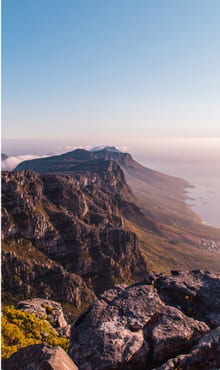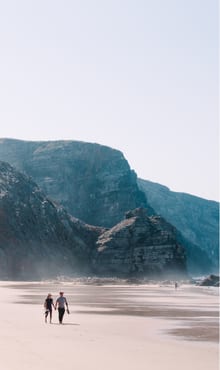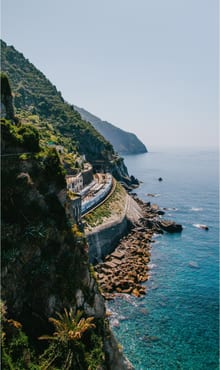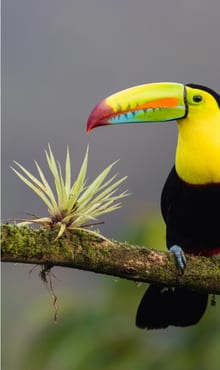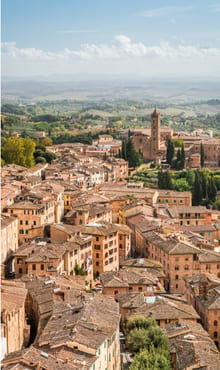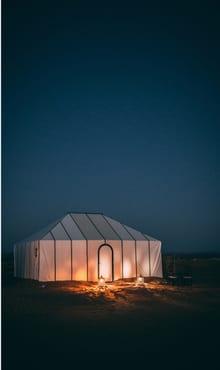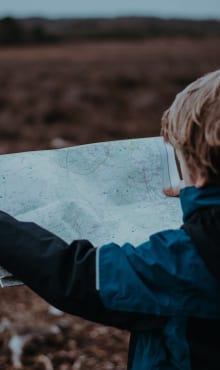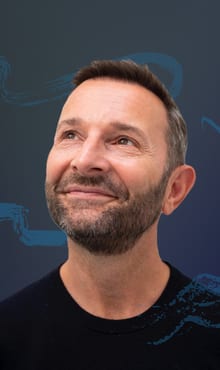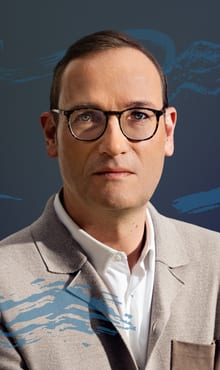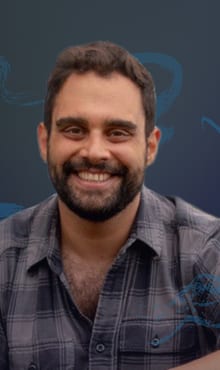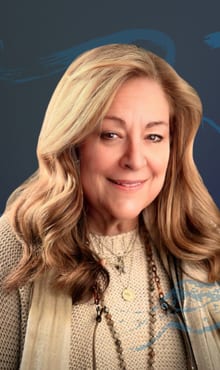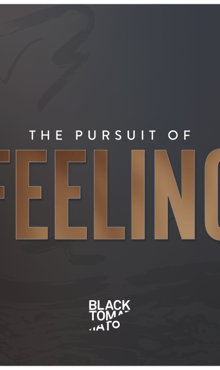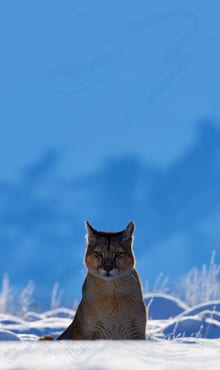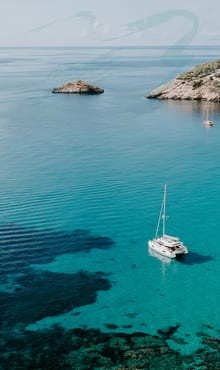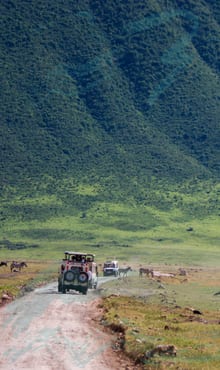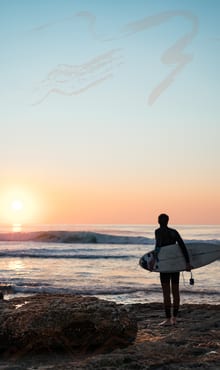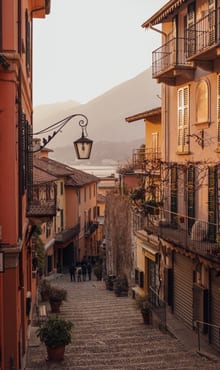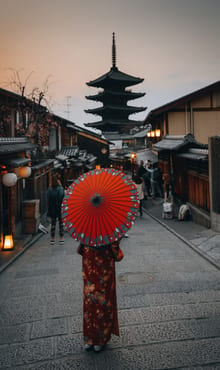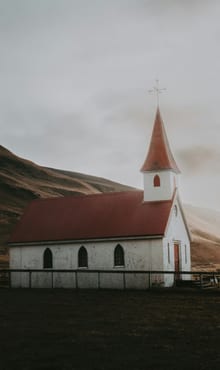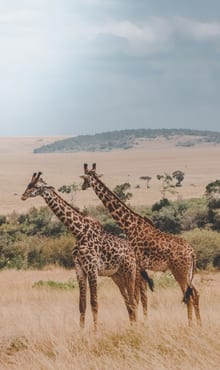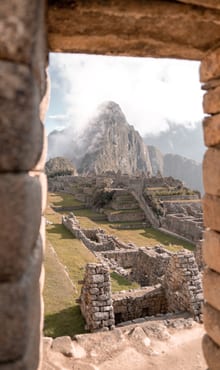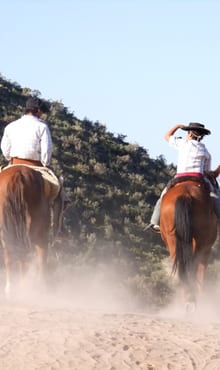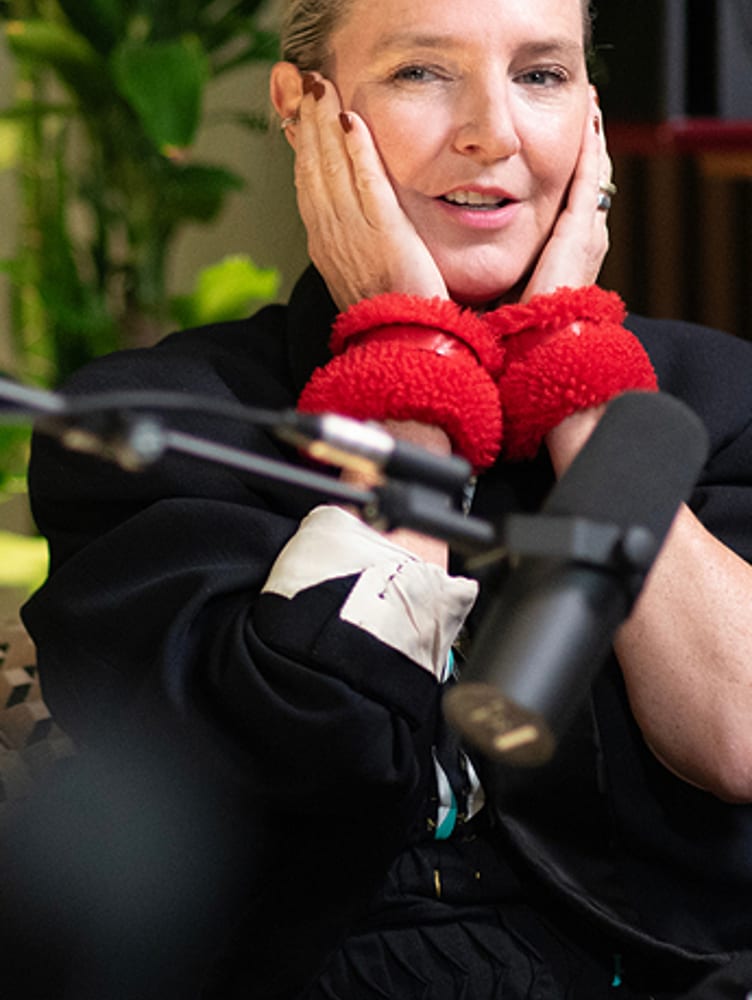Transcript
Owen Vince: 0:00
You’re listening to the Pursuit of Feeling, a podcast by Black Tomato. In this series, we want to explore not only the world of travel, but the world of emotion and what it ultimately means to feel our way through the world. Or to put it another way, what does travel do to our brains and our hearts, and even our souls, when we set off for new places and faraway shores?
Tom Marchant: 0:28
Today we’re joined by someone who truly embodies the spirit of adventure and storytelling Melinda Stevens. Melinda is the founder and creative director of Salt Lick, an agency shaping the future of travel with iconic brands like Belmond and inspiring newly launched London members club, the Roof Gardens. She’s the author of several best-selling books with Asseline, including Chic Stays and Secret Stays, and has long been a force in travel writing, having brilliantly led Condé Nast Traveller UK and Condé Nast Traveller US as their editor-in-chief. Beyond that, she’s deeply involved in shaping the next era of travel, advising on the Gen Z-focused app Step your World, and working with Gloobles, an Amsterdam-based culture network with a new London guide launching this spring. She also supports initiatives like Chefs in Schools and City Harvest, using her platform for impact.
Tom Marchant: 1:14
I’m delighted to be joined by my good friend, melinda Stephens, on this episode of the Pursuit of Feelings podcast. As you know, the podcast is all about exploring the relationship the relationship between travel and emotion and the idea that we believe in when we started Black Tomato the idea that perhaps we don’t always know where we want to go, but we know how we want to feel and bringing that to the fore. And for us, it’s a delight to have you here to kind of talk on that matter. So before we get into some of the real detail around that theme, just give us a bit of a background about yourself and your relationship with travel. I mean, it’s a big relationship, so I don’t know how long you’ve got, but yeah, that’d be great to kick that off with.
Melinda Stevens: 1:56
Well, I’m excited because I feel like I’m in a new phase of travel, actually because my kids are older now and the way that my work is panning out means that I get to say yes to more things. It was ironic, being the editor of Condé Nast Traveller, I didn’t say yes to a lot of things. I didn’t travel. Everyone always assumes I traveled a lot, but I didn’t. I was kind of in my box, working really hard, and now I’m out of my box and it’s brilliant being able to travel again in a way that I just always loved.
Melinda Stevens: 2:25
From when I was a kid, my parents were big travellers, wild travellers, culture travellers. I was a really to ensure you know, a really hopeless journalist for many, many years because I really wanted to be like a serious journalist, writing for serious newspapers about serious things. I found it really hard to get a job and I had no idea that being a travel writer or a travel editor could be a job and that penny didn’t drop until I was about 31. So when that did, then life changed for me hugely and it’s been a huge bloodline through my system.
Tom Marchant: 3:03
And was that penny not dropped because you always just put travel in a certain box? It’s almost like passion to be enjoyed outside of work.
Melinda Stevens: 3:10
Yes, totally, totally. I think in my 20s I was quite serious and it took me a while to lighten up. Then I just remember crying and crying and crying with pleasure, with this feeling that somebody could ask me about Morocco or Berlin and you know my opinion counted and then I could commission myself to go there. It was a very closed loop of brilliance. I should never have left Tatler. Actually that was the best job I ever had. I had to look after one feature a month and I would go. Gosh, I wonder what it’s looking. Cartagena looks interesting. There’s some music things going on there and this new little place to stay is open. Oh, I’ll commission myself, I’ll go to Cartagena, just bless who’s commissioning you.
Melinda Stevens: 3:57
I will commission myself. How should I pitch myself.
Melinda Stevens: 4:04
That’s a yes from me. That’s how that pitch went.
Tom Marchant: 4:06
Really high success rate is my pitch is you mentioned, obviously, the influence of your parents and growing up I mean travel was a big part of your life growing up.
Melinda Stevens: 4:15
Yes, probably one of the first feelings that I remember with travel was intense boredom. They used to take us on really, really intense historical, classical, cultural trips and also they both had the energy of kind of dynamos. We were like up with the crack of dawn. There wasn’t a museum or a tour or a ruin that we weren’t part of, and I just remember that. My first memory also of that feeling of being somewhere, extraordinary, I think, was Ephesus, somewhere like Ephesus, a great big, empty amphitheatre and being so hot and so bored. And yet, of course, I remember exactly what the sea looked like. I remember exactly what the stone felt like, I remember exactly the smell as we walked to it. I remembered exactly the feeling, and so none of those things go to waste.
Tom Marchant: 5:09
I was going to say, were those feelings almost that kind of developed in terms of their power or impact as time went on, as you reflected?
Melinda Stevens: 5:16
Because often people talk about.
Tom Marchant: 5:17
Sometimes, when you’re in that moment and there’s other things that are bothering you, you don’t perhaps savour it as much, because there’s other things you’re thinking of.
Melinda Stevens: 5:23
I don’t even know how it unpeels, to be honest, tom, it’s probably mostly by accident. I think, yes, if you travel, you have to be curious, obviously. So, for example, take that experience and then cut to 15 years later, maybe 20 years later, and I said, yeah, I’d probably commission myself again to go to Libya because I love deserts. And I thought again to go to Libya because I love deserts and I thought, oh, that desert looks interesting, that looks uncharted from my point of view. And of course that wasn’t what the trip was about at all. It was about being in Tripoli and going to Leptis Magna. I don’t even think I knew about Leptis Magna and we went to the Roman ruins there. I think we were the only people there. Oh, I just could not get over the feeling of the living city that Leptis Magna had been under one of the few I think I’m correct in saying this African-born Roman emperors.
Melinda Stevens: 6:17
The emptiness of it, the beauty of it and the feeling of it being a working town was just visceral, extraordinary.
Tom Marchant: 6:24
That thing you said there about. You know you look at a place or you’ll see something say the desert feeling uncharted, and you go and then you end up having a different experience. Is that kind of a beautiful way of travelling? You do travel for purposes, but also it’s the sense of not knowing or coming across things that are undiscovered. I mean, is that a regular pattern?
Melinda Stevens: 6:45
Yes, it’s a regular occurrence because I don’t read the literature. I haven’t read the itinerary, my geography is terrible. I’m hopeless at maps. The first trip that I went on in terms of feeling where I felt truly, truly in a different, unknown, uncharted territory, is when my friend, joe and I, who had wanted to travel across, we thought we would travel across Africa. We were 18. We thought we’ll start at the top and we’ll just go down to the across. We thought we would travel across Africa. We were 18. We thought we’ll start at the top and we’ll just go down to the bottom.
Melinda Stevens: 7:08
That was the amount of our research and we thought, actually, that looks like quite a long way, let’s go to India. And then, because again we’re so chronic, we ended up in Indonesia and we ended up in Jakarta. We just thought, god, what’s Jakarta? But there was this sign to Bali in the airport. We thought, but we’ve heard of that, so let’s go there. And we arrived in Bali and this was 1990 maybe and immediately fell in love with it, ditched all of our rucksack, hired a moped and set off into the unknown. And I remember, I think, on the second night on this moped trip we had terrible jet lag and I remember I think on the second night on this moped trip, we had terrible jet lag and I remember waking up at four in the morning or something and there was a huge torrential tropical storm going on and my friend Joe and I sat on the deck and just watched these huge raindrops fall on these huge leaves and I remember feeling totally and utterly free.
Tom Marchant: 8:02
I love that I mean you always captured places so beautifully. I think that feeling of the unknown right For some people it’s intimidating but also exhilarating at the same time, and some people walk towards it. Some people like to have it almost put to one side and get a little bit scared. That’s something you go towards the unknown because you see in the not knowing there are moments that are rather are surprising, and that sense of discovery is all the better for it.
Melinda Stevens: 8:25
Yeah, the not knowing. We could have a whole separate conversation around how discoverability is suffering.
Melinda Stevens: 8:32
I think is being challenged as a key emotion that is intrinsically connected to travel, and I think, with the world being so trodden now, that sense of discovery is at risk. So, yes, I always try to get as far away from the well trodden as possible. You know, I just went to Raja Ampat this new year. I don’t know if you’ve been there. Um, so it, raja Ampat.
Melinda Stevens: 8:59
My stepbrother is a huge marine, uh, conservationist. He runs a company called Blue Marine which is about protecting marine conservationist. He runs a company called blue marine which is about protecting marine reserves, and his favourite place is this place called rajat and pat which, for whatever geological and weather conditions, has the best preserved coral reef still on the planet. And I remember it like diving. As a kid my parents spent a lot of time in the bahamas and they would literally, you know, you would strap a tank to your back and you get, you know, shoved off the side of the boat, aged about, I don’t know, nine or ten. And then I’ve dived a lot since. I almost feel like it’s not real what I see in terms of the coral and in terms of the scene of devastation.
Melinda Stevens: 9:39
I almost think, like that, I must be seeing it wrong and then, somebody else is seeing it right, but I’ve now dived in enough places to know that that is the reality. And, raja Ampat, it takes you three. I think it took us three flights. I didn’t tell my daughter I took one daughter. I didn’t tell her till we were in the airport, because she doesn’t like sitting still and she doesn’t like long flights. So I said okay, here we go. Baby you ready? He said, tell me. And I said it’s Doha to Qatar, then we’ve got an eight hour layover and then we’re to Surong and then we’ve got a five hour boat ride.
Melinda Stevens: 10:14
She swallowed several times, she got over it and then we had the most amazing trip with the most amazing bunch of people. My brother had taken over this whole spot there and we dived three times a day, four times a day. Bush, bush, bush. And the first time I went under the water I burst into tears in my mask, which is a feeling in itself, because I just could not believe the state of this underwater wonder and the colours of the fish and the colours of the anemones and the amount of fish. It literally we got rushed at by fish, we got bumped by fish. There were so many people going in this direction, people going in that direction, batfish staring in the face, sharks everywhere. My sister-in-law saw a hammerhead. She found that less amusing. Turtles swimming around oh my gosh, such colour. It really made coming up out of that underwater world a disappointment. So Raja Ampat for me was an extraordinary thing.
Tom Marchant: 11:18
There’s so much in there. One thing the journey to get there, the length of time it takes.
Tom Marchant: 11:23
It’s interesting to see the reactions. Part of it, like you say, is because it’s getting increasingly hard to find these things. You have to go further. But is there also part of it? Maybe not for your daughter, but there’s a sense of it heightens the experience, the feeling, because you almost feel like you’ve earned it. You’ve had to go further, you’ve had to work harder or put yourself through more flights, more levels, more journeys to get that. So then the satisfaction of A seeing something amazing, but knowing that this isn’t something that’s easily done and not everyone’s going to be able to do it or be there. We see that as a feeling, almost like this pursuit of pushing yourself, but you push yourself for those end rewards. Is that something that?
Melinda Stevens: 11:56
resonates.
Melinda Stevens: 11:57
Well, I’m now going to be really contrary, because I have a problem with that too, in the sense that I do feel that places get valued because they’re far away, at the expense of what’s close and under our noses.
Melinda Stevens: 12:14
And in fact, one of the people that I work with, step your World, made me look at what I have on my own front door in a different way, in the sense that they were showing me kind of hamburger joints and little bars that were just where I live and act and I didn’t even know that were there, and that started me on a whole foraging mission around what I have around me. So I started surprising things that I didn’t use to prize, like lunch, picking a different place every day that was on my patch and just seeing what was under my nose, because there is things that have huge value and huge worth and are at huge risk here. Yeah, so I think we would do ourselves a disservice by just going that prizes and adventure and exoticism are far away. Some of my best adventures have been walking recently around the UK, which is odd for me to say because I’m lazy as a bone, but I think also we should remember that. We should remember what’s here and close by is also worth investigating.
Tom Marchant: 13:14
I agree massively with that.
Tom Marchant: 13:15
I think it’s quite easy to fall into, like you say, this mindset of interest and wonder only lies thousands of miles away, and if you’re lucky enough to work in this industry or be in this industry, you travel a lot.
Tom Marchant: 13:26
It’s easy to kind of skip past that. But some of the most you know, certainly being here when I was living in New York, you know, even in my own hometown of Birmingham you know there are places that are easy to skip past because maybe, perhaps I don’t know why maybe sometimes you think, not deliberately, but there’s a one thought of like well it, you know, there’s no urgency because I live here. But then you also forget that these places often need support and kind of, you know, might burn bright, then fade away so you don’t miss out on it. So trying to, maybe just trying to encourage that, the curiosity that drives you to think I’ve got to go spin the globe and go there, it’s like yes, that’s still great to do and that’s something I want to have. But actually I should try that to do things more frequently, more locally, and then I can probably have the best of both worlds.
Melinda Stevens: 14:08
Totally, I totally agree. You know, another place I just came back from was Mumbai. You know, sometimes I think, in our European sense, often we see Mumbai as a gateway to tons of other places, to Kerala, or often to Rajasthan, et cetera. But again, if you just do a city, stay in Mumbai was all I could have wanted it to be, no more. It’s again like a city not dissimilar to Cartagena, where I imagined one slice of myself living an alternative, living an alternative life there. And this is another amazing partner I went with and this was a really, really interesting trip organised by two groups mainly of women. One was a company called Gloobles that I’m working with, fundamentally based in Amsterdam, and one was a social impact organization called Tiny Miracles, also based in Amsterdam, but their work is in Mumbai. Gloobles had organised this wonderful bunch of women to meet the Tiny Miracles lot and we spent four days seeing Mumbai.
Melinda Stevens: 15:12
I Tom, in a ways that you just wouldn’t ever imagine to see, like really behind closed doors and people living in the most extraordinary and difficult circumstances, people living on the street with all of their families at the risk of having all of their stuff taken away the whole time by the police, etc. Etc. I really worried before the trip that it was going to be too much, too extreme. There’s lots of people who hadn’t been to India before. All of these really mixed emotions and it ended up being extremely impactful for all of us because, of course, the Indians are to make a massive generalisation, are incredibly funny and incredibly hospitable and incredibly curious and wanted to know about us and told their stories and we just had the most extraordinary time. So we will continue to do work, with Tiny Miracles, for sure. And what emotions I mean obviously a lot.
Tom Marchant: 16:06
But what were really sort of emotions stirred within you when you were out doing that, when you were kind of behind closed doors but also witnessing yeah, very different side as a kind of vague team leader, I kept like thinking that I needed to give the speech about let’s be mindful of our, you know, notions of white saviourness.
Melinda Stevens: 16:26
Let’s be conscious that we do not need to take our cameras everywhere and take photos of this, like you know, some of the things that we were doing. Let’s experience it in real time, in real life, without documenting it. Let’s be sensitive to being, you know, objectified by sticking our cameras, you know, in everyone’s faces the whole time, and having somebody in the sea putting a camera in your face is a really unpleasant speech. So I managed to give this speech to everyone on the last day, but I didn’t really need to do it because everyone was clever and sophisticated and because our hosts had just been. So what it made us feel like is let’s do more because we can, and the point about Tiny Miracles is they take all the sweat out of partnering up with these people, so you feel can do, rather than overwhelmed by hopelessness, which can happen.
Tom Marchant: 17:19
Yeah, and I think that’s one of the which sounds incredible is where you can see, almost like the pay forward, there’s something you’re witnessing or experiencing but that both stays with you but then perhaps instills like an ongoing attitude. Right, which is something that I think, which I also think is should be true of lots of travel, in terms of how it can change your perspective, change your outlook. Yes, when you plan travel, when you’re looking at trips whether it’s your own, whether when you’re commissioning yourself, obviously, uh, do you commission or plan with the pursuit of a specific feeling in mind, like you know, rather than a place, are you ever going right? Actually, this is, yeah, what I’m after.
Melinda Stevens: 17:52
I don’t know if you’ve been skiing with your kids, but it’s kind of hell on earth and it’s really when they’re little, it really defies description. And and they’re all peeing in their suits and you can’t get them out of the house and your husband’s going nuts and everyone’s forgotten their bonnet mom, and everyone’s crying and there’s snot everywhere and then they fall over and then you just you’re not even picking them up anymore, you’re just leaving them to like rot in their own blood and sweat and tears. It’s, it’s so. It’s such hard work and it’s such a privileged thing to be saying but it’s such hard work but I really really, really used to hate it.
Melinda Stevens: 18:33
I require quite a lot of silence and I require quite a lot of calm and reflective time, it turns out. And so what I wanted to do was ski in a quiet way, in a cosy way, in a almost like boil it down to its bare minimum. So we did this sneaky trip to Majeve. I don’t know whether you know the lovely hotelier, jocelyn Siboué. She’s really magic. She has lots of hotels, mostly around France, and she had a hotel that I always, always, always. You know like you have hotels on your board that you always wanted to go to. 99% of the time, you realize that that picture was not representative and that was a huge mistake. Show me this bit.
Melinda Stevens: 19:20
But that doesn’t look like this. Where’s this? That’s happened a few times. I won’t name names, but Le Femme de Marie was somewhere that I always wanted to go and I knew her as a hotelier so I knew she could follow through. And we got up in the morning, we’d have the same breakfast and then we’d put on our ski stuff, we’d go out on the slopes, we’d laugh at my little one a lot. We were a bit mean actually, because we started taking endlessly down. The always ended up at the black slopes by mistake, which she had to just go down on her bum, bless her. And then in the evening we’d take off our things and then we ate, which does not suit the curiosity of the travel editor mindset. We ate in the hotel. Every night we had the same drinks. We just wanted the raclette, and then we wanted the fondue, and then we went to bed, even though we had a two-bedroom room.
Tom Marchant: 20:16
We all slept under those cozy thick blankets like clouds, and then we get up the next day. We just do the whole thing on repeat.
Melinda Stevens: 20:20
Bliss, I was going to say, and bliss, so you’ve cracked your skiing challenge you just need to cut out everything else that makes it too complicated and too overstimulating.
Tom Marchant: 20:26
You need to keep it very pure I have a young family and I think the adjustment from being well, not travelling with with little ones to doing it, I I’d still try to push a lot of my like, well, we can do that and they’ll be obviously fine and and I sometimes get it right, but I often get it wrong and I think it’s like it doesn’t mean you still can’t have the adventures, but just trying to find things that can still give you a great feeling from it, but not feel well, not know that you’re basically going to not be able to get any kind of feeling, because you’re going to be just juggling chaos, chaos.
Melinda Stevens: 20:55
Can be chaos with your kids. I went to Mexico. I was writing a book for Asseline on the most beautiful Hotel Ascensia.
Tom Marchant: 21:01
Have you been there? No, but most of my company have been have been.
Melinda Stevens: 21:09
I’ve kind of feel like, well, what you’ve, that’s a mistake. Yeah, I know, go with your kids, that suits. And I took one of my daughters and she. She did apologize recently, actually, because we didn’t really address it, but I just kept on waiting down downstairs for her to come and join me for breakfast and for flying by on the pink sand and looking at the lapping waves, but she spent most of her time in her jacuzzi watching the Kardashians on her phone. I did not know what to say to her. Yeah, great feeling that it wasn’t our best, but I’m going to.
Tom Marchant: 21:40
I’ll find you a jacuzzi at home that you can watch the Kardashians on, she said that she was working.
Melinda Stevens: 21:45
She said she was working, but it turns out it was the Kardashians on her phone.
Tom Marchant: 21:48
I love the strategy. One thing you’ve talked about, and we’ve talked about before, is the role of scent in kind of stimulating emotion and feelings, and that’s. I totally concur with that. It’s so, so important.
Melinda Stevens: 22:08
I mean, yeah, I can tell by your reaction, that means something right from being back in rajah and pat which is western papua but it’s fundamentally indonesia took me back to my time in bali and all the other islands, however many 30 years ago. Because the clove cigarettes and me, my friend joe and I just thought we were like we. You know, we just got into smoking the clove cigarettes when we came back to London in the cold. You know it takes your head off. But when we were out there the clove cigarettes made perfect sense to us. That’s a very particular smell and as soon as I arrived in Raja Ampat, 30 plus years later, that was straight back to that, so that again, actually it’s a lot of embarrassing for my kids through smell I felt that I was like back with my people and that I could speak and I could speak the language and that I knew what I was doing. None of this was true. They were just like horrified, but that sense of memory made me feel like I really belonged. The other reason why I’m laughing is because we made these scents. I was working at the roof gardens, you know, like I really belonged. The other reason why I’m laughing is because we made these scents. I was working at the roof gardens. You know, those rejade kensington roof gardens, um, recently, and we made scents, perfumes with with fantastic perfume H Lynn Harris, and we did them as season spring, summer, autumn and and winter. And we had this really cheeky, naughty time where we just got everyone to think about what smell spring makes you think of, like squeaky tulip leaves and things pushing up through the earth. And then in summer and autumn and winter we noted down all these memories and smells, or even, if I remember in the autumn, one, you know when, this is really a specific one. I love it it’s a horse, like a horse, you know, when you’re feeding an apple to a horse and it crunches on the and they’ve got those big like crazy teeth and they munch on the apple and it makes all the smell come out of the apple. And so we put that into kind of autumn. But we also, like we said to Lynn, like the club is for summer, that’s going to be a bit naughty and cheeky Like can you make this, these smells of these really specific seasons, but make it feel like that’s, you know, when you’re young and you’re having your first kind of fumble, your hot summer fumble, you know, on the God Jesus now I’m being really graphic, but like on a beach in Val di Lobo.
Melinda Stevens: 24:38
Or can you just bring a bit of that you know, those first fumblingnesses to do with those seasons and bring them into those smells? So that’s what those smells are.
Tom Marchant: 24:48
It’s so colourful. I’m the same in terms of things that take you back. It’s quite funny.
Tom Marchant: 24:53
I remember growing up we spent a lot of summers on this farm in South Devon and friends of ours had this beautiful farm. It was a working farm and every morning my brother and I would wake up, we’d be woken up by the hens, the roosters, and we’d go out and Claude, his farmer, would be there and we’d get on his tractor and he’d just take us off into the fields and it was the smell of the hay and probably with some like, probably like some manure in there as well, for whatever reason. But there’s something that it is the most powerful stimulant for me and actually I sort of romanticise, but it does take me back to a childlike state, but it just makes me so happy. And then you have these other really random ones. Like you know, I lived in New York for five or six years and there’s a time where every kind of cocktail bar or anywhere in Brooklyn you go into the bar and they have like a Lollabo candle or something right and everywhere just smells like that.
Tom Marchant: 25:44
But now I walk into someone’s house and I immediately think I’m sort of in some random cocktail bar in the back streets of Brooklyn and that can be good and bad. But like it’s funny about bringing them back because a lot of hotels are big on their scents, right, they kind of have these defining scents and I’ve talked about this a few times. But sometimes when you go into these hotels and like it’s quite interesting, and they, you know, in their shop or something oh, you’ve got a diffuser you can take it home and it sometimes just doesn’t really work yeah.
Melinda Stevens: 26:17
And really work yeah and uh. Well, I think a scent is really fascinating for lots of reasons. I’m going to get all of my facts wrong here, but apparently a smell is your kind of dominating sense when you’re a child, over things like kind of language, for quite a considerable period of of years. And also memory and smell live in the same part of the brain, so there is something really specific about that particularly. I grew up in Hampshire for a while and I remember one of our dogs ate a rabbit or a hare. It was funny enough, the same area where water shipped down Rippling terrifying movie. Do not watch that, but I think we had to read it as a school book. But anyway, same part of the countryside and there were lots of rabbits and hares around and anyway one of our dogs had killed them. So we had these two baby hares that we nurtured and adopted and they would eat. Oh my God, this is horrible. They would eat spinach and broccoli and I can’t eat spinach and broccoli without thinking of those baby hairs.
Tom Marchant: 27:25
It’s amazing though the connection. I mean I’ve got ones that are just weird like some reason. Yeah, I love New York, but it must be like the smell of detergent they use in certain places, whether you’re in a bodega or even when you step off into JFK and now to anyone else. But I just love it because it just takes me back there and for ages I couldn’t work out. I was like there’s something about it. Then someone once said it’s just particular detergent, but it’s so powerful. You talk about broken things and things that kind of tell stories and this idea of finding things that you bring back home and kind of it reminds you or tells more stories. Are you actively looking at these things that you kind of just organically collect along the way? Just speak more on that, because I think it’s a fascinating insight.
Melinda Stevens: 28:09
I love collecting and it doesn’t matter whether it’s a shell. I used to do shells with the children, by which I mean I collected shells and the children did something else, and then I got them to label it or then I labeled it, and then we’ve got lots and lots of those which are wonderful, and then I did it in felt-tip pen or they did it in felt-tip pen and they’ve all faded. It’s so heartbreaking, but I’ve always collected, because everything is just so wonderfully different. I think all I’m trying to remember is what’s different about everywhere we go, and I have a sitting room at home that is full of really, really weird stuff. I mean the stuff that I’ve collected, like this old wooden fish from Niger. I hadn’t been to Niger, I just saw it and fell in love with it and it was a classic purchase. And when it arrived I thought it was going to be this small and it was like five foot long. It was apparently when the fishing had been very good along the river. People would stick this fish on their heads.
Melinda Stevens: 29:11
Anyway, I have to like unpack most of the stuff that I purchased quietly away from my husband and look, but even like I found a beautiful skeleton of a bat. God, I can’t remember the name of that amazing antique town Is it Tetbury? And the bat? You just, oh my gosh, it looks. You understand where the human bat man things comes from. It’s so human, it’s like a homo sapien and then it just has these extraordinary long fingers in the skeleton state. That’s beautiful. I collect so, yeah, so many books. That’s the other thing travel books, photography, books piling high, high, high. My husband remembers going to my mother’s house where he couldn’t see the television because my mum just had like so many books in front of it, and I feel like we maybe entered that stage and with that it’s, like you say, it kind of it’s moments in time.
Tom Marchant: 30:11
But is it also because you then look at those things and it reflects and it takes you back from?
Melinda Stevens: 30:14
it Totally. Everything tells a story, everything. The only things that I ever regret I’m just fascinated by this thing about regret the only things that I regret are the things that I didn’t do. The only things that regret is when I said, oh no, I’m too busy, I’m working too hard, or I won’t buy that because it’s too weird, or you know, you know, this isn’t about expensive stuff and I go oh my God, I wish that extraordinary skull of a I don’t know whatever it was. So I buy things because I collect, because objects are triggers for memory in the same way that smells are triggers for memory. They’re part of who you are and part of and books, it’s all the same thing. It’s a collection of I’m sure you’ve watched that beautiful diana vreeland, the. I must travel.
Melinda Stevens: 31:02
This is the journey of where your eye has traveled and what it’s lit upon yeah, and what has captured your imagination and why would you want to let that go? I?
Tom Marchant: 31:08
had a uh, not nearly as interesting romantic. But when I drove across the states we moved, moved from New York to California, I decided I was going to collect. I mean, I collected lots of things that would tell me the state, but I always had this thing about collecting sand or dirt from each state and I was going to have this map of things, places I’d gone to, and I envisaged it anyway. Basically, what I ended up with, because of my probably obvious ADHD, was I just loads of sand and soil.
Tom Marchant: 31:33
So I was like I’d forgotten where I’d got it and hadn’t labelled in time. So by the time I got there, it was just this like cupboard full of like random plastic bags and stuff which I insisted on keeping and had these grand visions of somehow testing it and working out.
Melinda Stevens: 31:49
Honestly, I bought them back and Hon just stick Arizona on it, just stick Utah on it and then just park it. I’ll just create something like yeah, yeah.
Tom Marchant: 31:57
Yeah, I’ll sell that in. We talk a lot about kind of the positive emotions that travel brings. I mean a whole kind of range of them. Have you ever had trips, you remember, where you’ve had the opposite, where you’ve either had something that’s bittersweet or, I was going to say, scared. But sometimes I think being scared actually can lead to positivity, because you know like the adrenaline goes, but the only thing you look back on your travels where perhaps what you expected wasn’t what you got, and you know maybe it’s a regret or maybe it’s something that’s yeah.
Melinda Stevens: 32:23
I mean it was funny I knew that this question was coming and it was making me giggle, because I I remember on another trip I got myself into a kind of spot of bother with two boys and I remember thinking it doesn’t matter, because I’m going to go on this trip and I’m really going to think about it and reflect on it and just come up with the right, correct, honourable plan. And then, of course, I travelled for two months and I didn’t think about either of them at all.
Tom Marchant: 32:49
A lot days before you got back.
Melinda Stevens: 32:51
Yeah, I went oh God, jesus, I’m going to need to have some kind of response to this. But just to go back to the near-death thing because, gosh, no, you don’t want to make short shrift of it, but yeah, like I have a very good travelling partner who’s, you know, one of my best friends, and I’ve nearly died with her at least 17 times on at least 17 different trips. And that’s really because you’re putting yourself out there, you think that you’re invincible and you’re on motorbikes and you’re going to cop bites, or you’re saying yes to everything you know, back when this was, when the world was less chartered. But yes, testing the edges of yourself and how you are in those extremes, I think is a really relevant part of growing yeah, I think it’s really important.
Tom Marchant: 33:37
I think I think because it’s almost not like, it’s not quite the kind of you don’t get anything original if you, if you’re not willing to fail. But there’s a bit of that with travel in terms of growing yourself or finding experiences, that unless you’re willing to take a risk or just sit comfortably with discomfort and see what happens.
Tom Marchant: 33:53
I think also also it’s interesting. Not everyone does this, but sometimes I think when people go into their travel heads or they just tend to think, well, the rest of the world, because it’s not like my day-to-day, it’s sort of safe or nothing’s going to go wrong because I’m travelling or people are going to think I’m on holiday. And this is not to scare monger, but I think it’s interesting how someone’s perception of how they feel day-to-day can just change massively when they’re travelling, and I think that’s a good thing as well. Sometimes I think some people do push themselves more when they travel because it might be the only time you’re going to be in a place, or the kind of no-regret side of it as well.
Melinda Stevens: 34:21
Yeah, for sure.
Tom Marchant: 34:27
Talking about your time at Condor’s Traveller, you obviously commissioned and wrote amazing features and when you look back at that a part to the world or particular stories that you conceived and you you produced that really meant a lot from an emotional side or stand to stand out.
Melinda Stevens: 34:42
I mean, there’s so many in it and you do such amazing output it always would make me laugh a tiny bit because, like the atmosphere of the magazine that I always wanted to be made was like those early trips, like being out in nature and exploratory and not grand, not smart. I wanted it to feel like freedom and exploration and spontaneous. So we spent a lot of time writing about surf places, which was ironic because no one on the team surf but surfers have a really good nose for good beaches and you know beach shack living.
Melinda Stevens: 35:24
And that was what I was into at that time. So we would just like get slightly embarrassed. I was like, oh God damn it. Surf shot again for this team of people who don’t surf. But you know that was a vibe. But funnily enough, gosh, there’s so many lovely photographers who work there and some of them actually I still work with. You know, olly Pilcher has an extraordinary eye for that kind of living and lifestyle. My God, he just makes you feel that he and he often photographs his family actually feels like they’re living the best life that you possibly could well it’s like can be really intense and no one works harder.
Melinda Stevens: 35:59
But he has an extraordinary spirit, but one of the I god I hope I’ve got his name right. It was a piece on Palermo in Sicily. I think his name was Bill Phelps. It was the opposite of what the shoot was supposed to be Like. It was very dark, it rained every day and he, I think just it seemed just like, seemed to have just shot at night in the rain and it was the most beautiful, breathtaking feature, body of work and it made me, it completely changed my aesthetic. Actually, and I think that’s an important part, is like you have to keep on.
Melinda Stevens: 36:44
There’s another photographer that I work with at the moment who completely changed my way of looking at things, and that’s what you’ve got to keep doing Like. For me, as a creative director, it’s all about what I see and how I see it, and then how that storytelling gets purveyed. And people, whether they’re writers or whether they’re photographers, who make you look at something that you’re so used to looking at somebody who makes you look at it in a different way ah, that’s just such a breathtaking privilege. I love the fact that I keep meeting new people with new lenses and a new turn of phrase or a new angle or a new sideways, and I just keep learning and it’s bliss.
Tom Marchant: 37:25
And the power in that is the way you open your mind to that, because I think a lot of people as creative directors can be very much like. Well, this is just my way, you know, and you see people kind of get stuck in those ruts.
Melinda Stevens: 37:35
I think it’s like again, part of my saying yes to everything has been about meeting a lot of people. I didn’t used to have time to meet people and I thought I was a certain type of person. And now I’ve worked out I wasn’t a certain type of person. I just didn’t have time or I chose to not make the right decision in that time. Chose to not make the right decision in that time. So now I’m out and I’m meeting people and mostly I’m listening. I’m listening because people who are travelling around the world now in their 20s and their 30s oh my god, you know people like step your world or people like tripping, and if you know, like I just love listening to what they value and and what gives them pleasure and what they’re interested in, and I tune into that.
Melinda Stevens: 38:17
It’s.
Tom Marchant: 38:17
For me it’s the listening yeah, and that’s how I think it keeps the mind fresh. This podcast about the pursuit of feeling what. What does that mean to you?
Melinda Stevens: 38:25
you know, probably one brain cell of mine is brain related and all the rest of the cells are feeling. I think I just, you know, move around like a kind of Donkey Kong barrel, feeling everything, and I’m what am I grateful for it? Open to it, sometimes I’m scared by it. Hopefully, the best thing that travel can make you feel is to be more sensitive to others, because you’re not the center of your own world, much as though it can sometimes feel like that, particularly if you have a kind of dominant, you know, personality in your own head. So yeah, for me it’s all about feeling, and it’s often why I now travel alone. A lot is to have that more pure experience of feeling and being in my head, being in my body and being in this world.
Tom Marchant: 39:17
Well, I mean perfectly encapsulated. Thank you, um melinda. That’s been brilliant and thank you so much for your time today. It’s always so inspiring and enlightening to talk with you. I know everyone listening to this will as well say thank you very much for joining us thank you so much, tom you’ve been listening to the Pursuit of Feeling, a podcast by Black Tomato.
Owen Vince: 39:39
If you’ve enjoyed this episode, then please hit the subscribe button. We’ve got a lot more episodes on the way and if you’re feeling inspired by what you’ve heard today, then visit blacktomatocom. We’ll help you to travel where your heart is. Thanks for listening.




